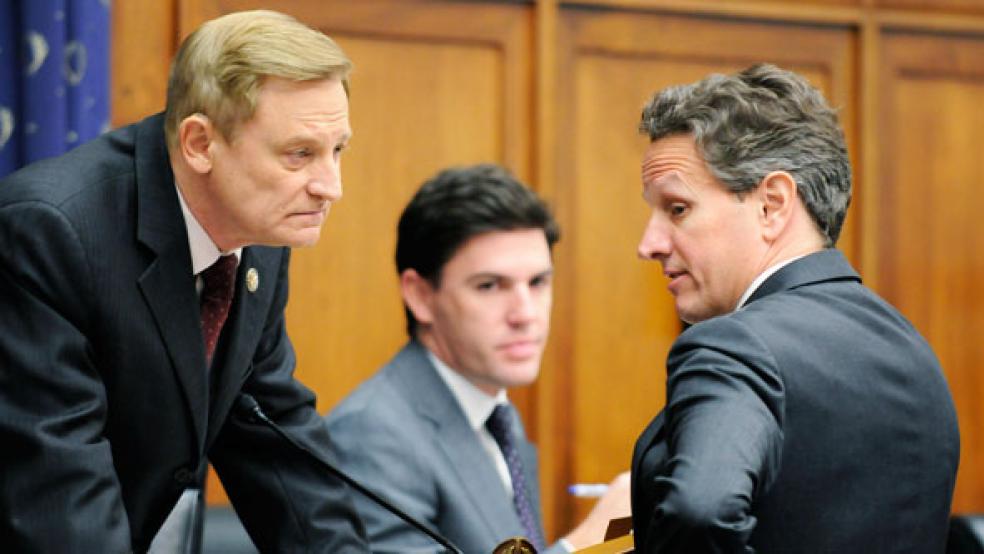A bill banning insider trading by federal officials that the President is expected to sign does not go far enough to prevent government workers from trading on the confidential and proprietary information they glean from their jobs. The lawmakers' modest step clamps down on some of their own financial transgressions -- members of Congress, White House officials, their staffers, and many federal employees will be punished for bolstering their own investment portfolios through insider trading.
However, the bill ignores the larger questions regarding how lawmakers are more tempted than ever in an election year to capitalize on information they offer to lobbyists, businesses and members of Super Pacs for political gain.
The bill requires House, Senate, and Executive branch officials and their staffers to disclose online when they buy or sell any stock or bond valued at more than $1,000, except for transactions in large publicly traded investment funds. It also requires government officials to disclose mortgage information on their primary residence.
Public officials appear likely to have benefited from insider trading tips over the years. A 2004 Georgia State study found that U.S. Senators’ stock portfolios outperformed the market by about 12 percent per year.
Last fall, “60 Minutes” brought the issue to light, detailing examples of members of Congress acting on insider tips to maximize personal investment income. They called it "honest graft," since Congress gets a pass on trading inside information. One subject was House Financial Services chairman Spencer Bachus, R-Ala., who is currently being investigated by the Office of Congressional Ethics for making more than three dozen trades in the two months that followed the financial system meltdown and $700 billion bank bailout.
“It’s true that insider trading is a problem,” said Norm Ornstein, a resident scholar at the American Enterprise Institute, “But it’s a fact that the many money-related, perhaps more relevant, dubious practices that take place in the lawmaker community, that go way beyond insider trading, are left unaddressed.”
The House stripped out two components of the original Senate insider trading ban, which would have made more wide-reaching strides in stamping out government corruption, Ornstein said.
One would have required any individual or business selling inside information to lawmakers and their staffers to register with Congress like lobbyists, who document their dealings online under federal law. So-called political intelligence firms have blossomed in recent years, collecting information to sell to hedge funds, private equity firms, and high-roller investors.
While federal law does not explicitly prohibit the practice, the now-famous 2010 Citizens United Supreme Court decision, which removed restrictions on corporate campaign donations, has fed into a growing culture of financial dealings not afforded to Americans without deep pockets. “We now know that you’ve got hedge fund operators putting lots of money into some of these 501(c)4 organizations and Super PACS. So the temptation for a lawmaker or a staffer to know that something’s about to happen, and call up one of these people and say, ‘Just a little tip. A subcommittee’s about to vote on this,' is strong—especially in an election year,” Ornstein said.
Angela Canterbury, Director of Public Policy for the Project on Government Oversight echoed Ornstein. “Prohibiting insider trading gets at the subject of public servants using information for their own financial gain, which will lead to more people getting caught on stock trades, which I think is useful,” she said. “But what’s missing now is more the sunlight on the financial gain of those soliciting information from public servants, and how that in turn lines public officials’ campaign interests.”
The House also nixed a provision making public corruption criminal laws more punitive, and affording federal public integrity prosecutors heightened power to probe public officials. It’s become more difficult to bring a case against a public official after a 2010 Supreme Court decision undid a section of the law that enabled prosecutors to target state and federal officials on charges that they acted in their own financial self-interest rather than for the public good.
“Lawmakers honestly don’t feel they have a lot to fear from the public integrity section of the Department of Justice, and that could really turn into a huge problem,” said Melanie Sloan, Executive Director of Citizens for Responsibility and Ethics in Washington. This bill was one of the few changes to change that pattern, Sloan said. “But over in the House, they’re just not anxious to let prosecutors more anxiously target public corruption and give the public a window into their dealings with the private sector,” she said. “If you’re a legislator, why do you want to make it easier for prosecutors to go after you if you’re going to do something illegal?’





